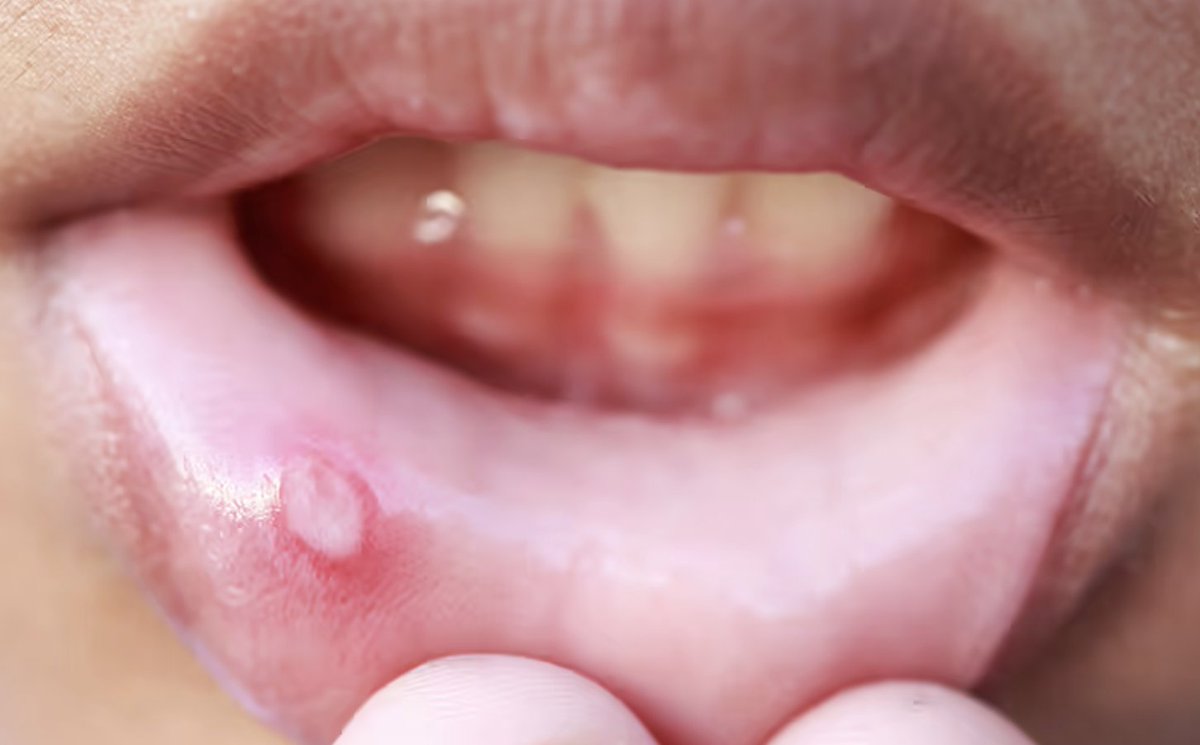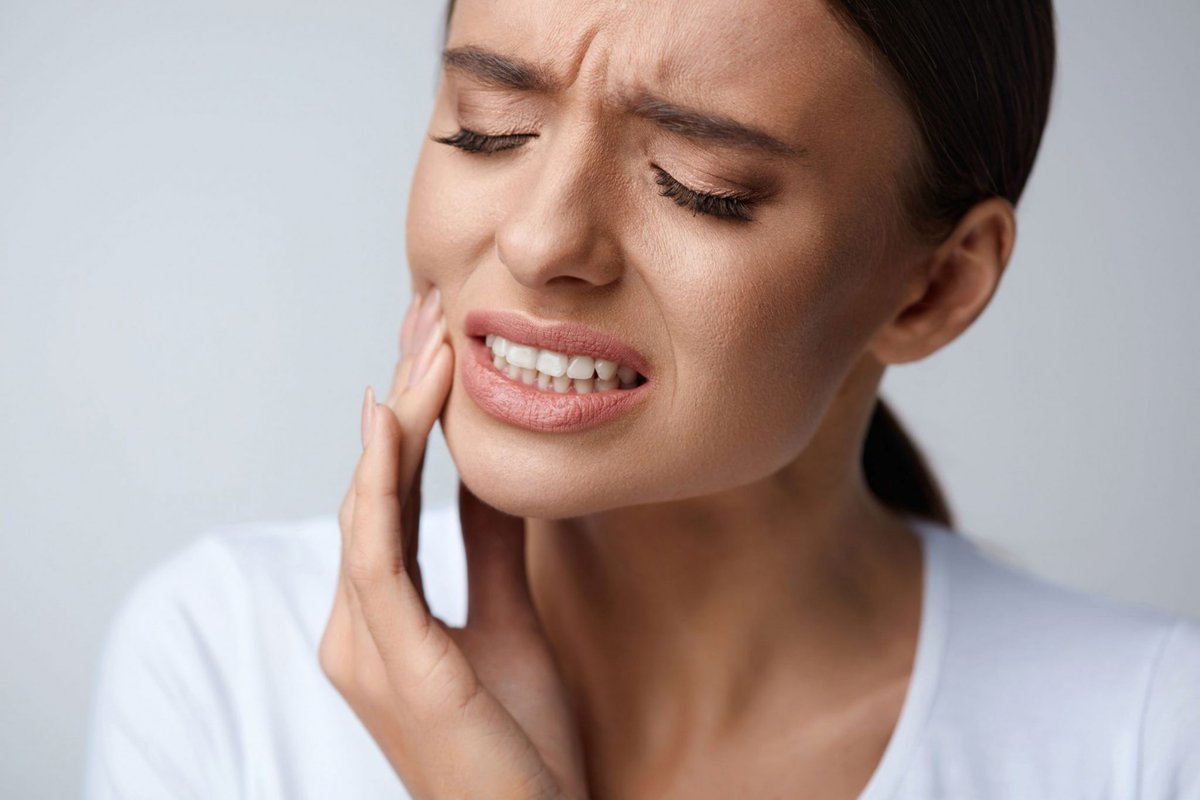I’ve had canker sores for as long as I can remember. For 35 years, I pushed through the pain, but four years ago, my suffering ended. Here’s how to treat canker sores effectively.
1. What are canker sores?
“I know it when I see it”, Mr. Steward famously said, so without further due, this is a canker sore:

Canker sores are small, painful sores that can appear inside the mouth and on the tongue. They come out of nowhere and typically cause some bad-ass, fire-like pain for 7-10 days unless you know how to treat them (coming up).
The first day this lovely guest appears, you’ll feel pain in that area of your mouth. Touching it gently with your tongue, it becomes clear that the skin in that area is not smooth anymore. Over the next few days, the sore typically grows a bit in size and becomes more and more painful. The last few days are typically less painful, and you get your life back when they are finally gone.
2. What do canker sores feel like?
The sores create a strong stinging feeling, like pouring alcohol into an open wound. The pain typically shows up when eating or drinking, but if it’s a bad one, you may feel pain continually.

The pain is lower or higher depending on what touches the sore and how bad it is (size/intensity). For example, spicy food isn’t a great idea when you have canker sores, while yogurt is less painful. Meat is more painful than eggs, oranges is more painful than a banana – you get the idea.
Unfortunately, the canker sores typically cause two additional effects: tiredness and headaches. Whether these issues are caused by the canker sores or the pain coming from them, I don’t know, but I suspect the latter.
A few times, my sores have been so painful that I thought I had a wisdom tooth issue. Once, I had so much pain that I decided to see my dentist and remove a wisdom tooth, only to find out that I had three canker sores deep in my mouth and that I had removed all my wisdom teeth 20 years ago!
Another time, I left work early as I thought I was sick. I was tired, warm, and had a headache. When I got home, I took my temperature: A solid 36.7°C (98°F), meaning no fever. It was the canker sore. I knew I had a bad one, but on closer inspection, I had two big fuc*ers living large in my mouth.
3. An ounce of prevention is NOT worth a pound of cure
Benjamin was a smart guy, but he probably didn’t know much about canker sores.

Prevention? Nothing annoys me more than reading a 15-point Mayo Clinic list of “tips” for not getting canker sores. Almost none of these tips work.
I’ve heard and read all kinds of theories about what causes canker sores and how to prevent them. Some believe they get sores from eating raw tomatoes or popcorn/crisps. Others say it’s stress. Someone else thinks it’s alcohol.
The only thing I have found that has predictive value for most people most of the time is that if you bite your tongue or somehow else damage the inner linings of your mouth, this often causes a canker sore to appear within 1-2 days. That may be why some people believe popcorn or crisps cause the sores (sometimes eating these can damage the mouth or tongue).
So, there is nothing out there (that I’m aware of) that can stop the sores from appearing (reducing mouth/tongue damage being the exception). They just appear. Sometimes you get several sores a week, other times months can pass without getting a single one. Some people stop having canker sores altogether once they pass 30 years old, others have them for life.
There’s no clear pattern. Accept that the sores will appear now and then and treat them smartly (see below).
4. How to treat canker sores
An excellent treatment for canker sores had been available for quite some time, but I didn’t know about it. Until four years ago.
We interviewed a candidate for our startup. Weirdly enough, I ended up discussing canker sores him. That poor guy had them weekly, but you know what they say: no pain, no gain. Because of his huge problem with canker sores, he had spent a crazy amount of time trying to prevent and treat them. Like me, he had no success with prevention, but eventually, he found a treatment that blew my mind.
“These days, when I get one, I just treat it once or twice and that’s it, no more pain, no more tiredness, and no more headaches.” I almost hired him on the spot just to know what the miracle cure was!
“There’s this product.”, he said, “You apply some liquid on the sore. It burns like hell, but afterward, the pain is gone. Most sores only have to be treated once, others need one more treatment and in very bad cases even two more. But this treatment has changed my life”.
I am not affiliated with this product or the company behind it, but this treatment has changed my life too. I never travel anywhere without it, and whenever I get a canker sore I treat it with that liquid.
What’s wild is that while 20% of the US population is estimated to have had a canker sore, few people know about this treatment. I hope this thread will help change that.

Oralmedic is the product. They seem to have frequent delivery problems so whenever I order them to Bergen, Norway where I live, I order a big batch of 10-20 items. Where to order from depends on where you live, but just Google “Buy Oralmedic” to see several options.
The treatment process is as follows:
1. Dry the sore.
2. Apply the liquid for a few seconds, making sure you get it into every part of the sore.
3. Rinse your mouth well.
NB! Make sure you don’t get any liquid in your eyes.
Right after you’ve done the treatment, your mouth will still hurt and you will feel violated for a few minutes. But then, slowly, you’ll feel less and less pain. Within an hour the canker sore will be significantly less painful, and even more so later in the day. The tiredness and headaches will disappear too, though that may only happen a few hours later or the next day.
As our interviewee said, sometimes you need to treat a sore more than once. This is because in some areas of the mouth, especially on the tongue, more movement and friction are causing the treatment to wear off too fast. Another reason is that sometimes the sores change and/or grow outside the area where you applied the liquid.
At the start of this thread, I wrote that my suffering finally ended four years ago. That’s not strictly speaking true. I still suffer from the canker sores when they appear and until I treat them. So perhaps my overall pain from these sores has been reduced by 80-90% with this treatment. Not bad.
Regarding the interviewee, since canker sore expertise wasn’t on the job description we ended up not hiring him. Sad. But I made sure to tell him that he changed my life and I dedicate this thread to him (you know who you are Dear Sir).
5. The one great thing about canker sores
I want to end with the stoic’s approach to canker sores. Do they suck? Yes. Badly? Yes. Is there anything good about them?

I think there is. Canker sores are painful. Being able to live with such pain for a long time increases your pain threshold so that you can endure other uncomfortable things when you have to.
The treatment will reduce this positive impact obviously, but if you want to feel good about all those years you had these sores and no treatment worked, think about how pain-tolerant you’ve become!
What is your experience with canker sores?
Share your tips and experiences below. I’ll update this post with the best tips.
